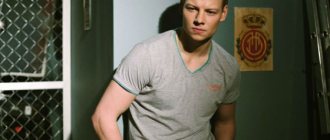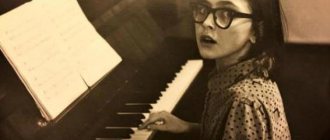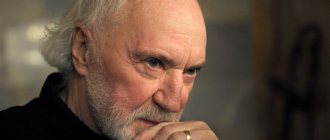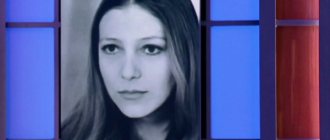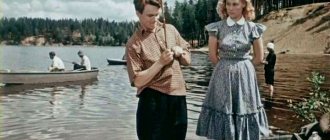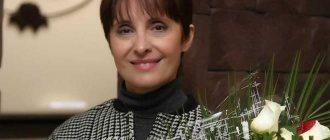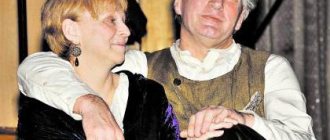Piletskaya: beautiful and successful!
She has about 100 theatrical roles and more than 45 films, including “The Green Carriage”, “Princess Mary”, “Different Fates”, “Silva”, “Farewell to St. Petersburg”. She posed for the artist, and also for her godfather Kuzma Petrov-Vodkin. Tatyana remembers Alexei Tolstoy well: loud-voiced and big, who lived next door to her godfather. She was credited with having affairs with the country's most famous handsome men - Georgy Yumatov, Oleg Strizhenov, Alexander Vertinsky.
Tatyana Piletskaya, an actress whose biography is similar to a fascinating story, felt real female happiness only after forty years; the period preceding this consisted of a struggle for survival, mental pain and loss of loved ones.
The life of little Tanyusha
Tatyana Piletskaya, whose films were watched with enthusiasm by the whole country, is a native St. Petersburger. She was born on July 2, 1928 in a house that previously belonged entirely to her grandmother. After the revolution and the resulting “densification”, the family of the future actress found themselves in two small rooms with access to the back staircase, which previously was used only by servants. Yesterday’s owners were lucky with their neighbors: they were Sergei Eisenstein, whom little Tanya had never seen, and the Vasiliev brothers, masters of the film industry. At that time, the legendary directors could not even guess that Tatyana Piletskaya, an actress, a future star of Soviet cinema, who in 1957 managed to conquer the Venice Festival with her talent and beauty, lived with them on square meters. Several European film studios will want to see her in their films, but in the USSR it was not customary to let their artists work abroad. And proposals for cooperation in those days often did not reach the recipients.
The most interesting
Actresses with big noses (03/22/2018)
TOP-9 Hollywood actresses with non-standard appearance (01/10/2018)
For the sake of this role, the actress learned to prance on a horse, and in the credits of this film she first appeared under a new name - Piletskaya. At that time, serious changes occurred in Tatyana Piletskaya’s personal life - she got married, after filming she left with her military husband to the north and never attended the premiere of “Pirogov.”
In the film “Princess Mary” Tatiana played Vera - Alexander Vertinsky recommended her for this role.
“Alexander Nikolaevich took my photographs and transferred them to the Gorky Studio, where at that moment they were going to shoot the film “Princess Mary”. And he advised the director: try this actress for the role of Vera. So, thanks to Vertinsky, I was invited to audition,” recalls Tatyana Lyudvigovna.
Then there were several more successful films, and in fifty-six the actress was invited to a film that brought her deafening popularity.
"Princess Mary"
However, the role of the bitchy beauty that Tatyana Ludvigovna had to play in the film “Different Fates” had not only a positive, but also a negative impact on her career - she played her character so realistically that many viewers and directors could no longer imagine her in another image .
In the photo: Piletskaya in the film “Different Fates”
As an actress, this had negative consequences for Pilecka - she was not approved for the roles in which she would like to star, due to the fact that the actress’s gaze seemed too evil to the directors, who saw her as her former heroine.
"Bride"
Tatyana Ludvigovna was very grateful to Nikulin and Schroedel for the invitation to the film based on Chekhov’s work “The Bride,” in which she played the central character.
In the photo: Piletskaya in “Silva”
For a long time, Piletskaya was given only secondary or even secondary roles, until in the early eighties she starred in the musical film “Silva”, in which she played the main character’s mother. The difference between this role and the previous ones was that it was the first age in the biography of Tatyana Piletskaya, when the actress appeared before the audience no longer as a fatal beauty, but as a noble middle-aged lady. It was also unusual that it was a comedic role.
"Palm Sunday"
An unforgettable event in Tatyana Piletskaya’s creative biography was the film “Palm Sunday,” in which the actress played a ballet star. Despite her former popularity, only after crossing the half-century mark did Tatyana Lyudvigovna feel in demand among film and theater directors.
Great-great-granddaughter of the famous Ulan maiden
Tatyana Piletskaya's great-great-grandmother, from whom the girl inherited strong character traits, was called Louise Graphemus. This woman was a Ulan maiden. Her husband fought against Napoleon in the Russian army, and she decided to find him. She left her two children at home, changed into a man’s uniform, acted on the side of the Russian army in the corps of General Blucher, was wounded in the neck, then in the leg, lost one arm and went to boarding school with the rank of Uhlan sergeant. She found her husband, but he was killed before her eyes the next day. Louise's feat in those days was enthusiastically described in newspapers, and she herself was called the second Nadezhda Durova. Then Tatiana's great-grandmother was able to marry for the third time to printer Johann Kessenich, to whom she gave birth to several more children.
In the 40s of the 19th century, she acquired the “Red Zucchini”, famous for the fact that Catherine II spent her sleepless night there on the eve of her accession to the royal throne. It is this establishment that is mentioned in the works of Tynyanov, Lermontov, and Pushkin. Louise also had a dance class, the description of which is found in Russian classics.
Perhaps this is mysticism, but Tatyana Lvovna Piletskaya made her debut appearance on the professional stage in the wooden theater of the Izmailovsky Garden, built on the very spot where her great-grandmother’s dance class had previously been located.
At the beginning of Tatyana’s career there was cinema, which she eventually parted with and went to work in the theater. Usually the opposite happens. Her godfather advised her to send Tatyana to a choreographic school, but the war prevented her from becoming a real dancer.
[edit] Family
The actress's great-great-great-grandmother was the famous Louise Graphemus-Kessenich, a woman officer, participant in the Napoleonic War of 1812-1815, Prussian Uhlan sergeant. She was born in Germany in 1786. She married a Prussian officer named Gathemus and gave birth to two children. The husband died during the war with Napoleon. But even before his death, Louise, hiding her gender, joined the corps of General Blucher, who fought against the French as part of the Prussian army. She fought bravely and was wounded several times. She lost her right arm and, with the rank of Uhlan sergeant, was granted a disabled pension. In the newspapers of that time she was called “the second Durova.” Having moved to St. Petersburg, Louise married printer Johann Kessenich, gave birth to and raised children. And in the 40s of the 19th century, she became the owner of the “Red Zucchini”, famous since the time of Peter the Great, a tavern on the tenth mile of the Peterhof road. It is known that she spent a sleepless night there on the eve of the coming to power of the future Empress Catherine II
— the actress said this in an interview[5].
My grandmother owned a house in St. Petersburg on Tavricheskaya Street.
The actress’s first husband, Pilecki, is a sailor, captain of the 1st rank. The actress went to the North with him, where their daughter Natalya was born. They lived together for 15 years.
Second husband Vyacheslav Timoshin is a soloist of the Leningrad operetta.
The third husband, Boris Ageshin, is an Honored Artist of Russia, mime. At one time he worked with E. Piekha and A. Bronevitsky in their ensemble “Friendship”.
Granddaughter - Elizabeth
Piletskaya Tatyana Lvovna: biography of wartime
During the war, in 1941, their school from Leningrad was evacuated near Perm; The conditions there were very difficult, but a thousand times better than in the besieged city. Tatyana, along with other students, was starving, but most of all at that time she was tormented by the thought of the fate of her abandoned relatives and friends.
After returning, the girl learned that her grandmother had died of hunger, her brother had died at the front, and there was nothing left of the house. Due to his German origin, his father, Urlaub Lev Lyudvigovich, who served time in Krasnoturinsk, was repressed. He was released only in 1958.
There were only two of them in this world: Tatyana and her mother. All this grief left its mark on the mental and emotional state of the girl, who decided that she could no longer be a ballerina. After graduating from the choreographic school in 1945, Tatyana Piletskaya, whose biography is firmly connected with the theater stage, began studying in the studio at the Bolshoi Drama Theater named after Gorky, some time later she became an artist of the Musical Comedy Theater, and not without the help of Anatoly Viktorovich Korolkevich, a wonderful actor, quite was often invited to film in episodic roles.
Tatyana Piletskaya: My great-great-grandmother lost her arm at Waterloo!
The future husband of the famous actress brought a bottle of rum and 200 g of sausage on the day they met
The star of Soviet cinema Tatiana PILETSKAYA celebrated her 85th birthday this year. The debut of one of the most beautiful actresses in our cinema took place in the film “Cinderella” back in 1946. But the film “Different Fates” brought incredible popularity to Tatyana Lvovna. She played Tanya Ogneva, to whom the folk romance “Why didn’t you meet me, young, tender...” was dedicated.
“I’m a happy person,” Tatyana Lvovna smiles. — I tried myself in three types of art: ballet, cinema, theater. I don’t regret leaving ballet, although there were ups and downs in the acting profession. Unfortunately, many of my partner friends are no longer alive. Nikolai Cherkasov, Galina Skorobogatova, Glikeria Bogdanova-Chesnokova, Vera Maretskaya... These were wonderful, simple people. For some reason Vera Petrovna called me bun. But I wasn't offended at all. The main thing I understood in life: the more significant an actor, the simpler he is as a person. And now many young artists already consider themselves stars, although they have only worked in one or two TV series. The film “Different Fates” brought me success, but after this picture the image of a negative heroine stuck with me. Probably because I treated the men who loved me so rudely in the film. The public often forgets that on the screen in front of them is not a real person, but an artist. By the way, I have been communicating with Yulian Panich, who played my beloved Fedya Morozov, all my life. Now we are calling on Skype - he lives in France.
| Tatyana Lvovna is still in great shape |
— This year you have another anniversary: you and your husband, artist Boris Ageshin, have been together for 40 years. How did you congratulate each other? — We weren’t always able to celebrate our wedding day: either Borya was on tour, or I was. But this year they celebrated. My husband gave me ruby earrings, and I gave him a watch. Our family and friends came to the Actor's House. I usually call my friends home. I like to receive guests and bake pies with cabbage. But, alas, time flies, there are fewer and fewer friends... - Are you a jealous person? - Very! Over the years I have become even more jealous! My Borka is also terribly jealous. -Where did you meet? - ABOUT! This is an interesting story! I had a difficult period in my life. And then one evening my friend Margarita calls. She and I starred together in the film “Oleko Dundich”, where she played a beautiful gypsy. “Tanya,” says Margot, “I’ll come to you now, but not alone.” - Margarita, but I have nothing in my house except black bread and coffee. - It’s okay, we’ll buy something.
| People's Artist of Russia Tatiana PILETSKAYA has been happily married to Honored Artist of the Russian Federation Boris AGESHIN for 40 years |
Soon the doorbell rings, I open it, Margosha is standing, and behind her is a young man with black luxurious curls. I invited the guest to go into the room, and Margot dragged me to the kitchen. “Are you crazy? — I started to scold her. “Why did you meet such a young guy?!” “Tanya, this is not my boyfriend,” my friend hastened to justify herself. - I brought him for you. - What does this mean for me?! - I exclaimed, but then Borya entered the kitchen, and we hushed up the conversation. The guests brought a bottle of rum and 200 grams of sausage. I cut some bread and we had a good time. Borya seemed like a pleasant person to me; the only thing that irritated me was his lurex vest. I thought, what a strange man. In a vest with lurex... Then it turned out that Borya was also an artist and came to me straight from a performance. Before leaving, Boris asked for my phone number. He has been calling it for 40 years now (laughs). My husband is much younger than me, but this has never interfered with our relationship. (Husband is 12 years younger. - M.S.Sh. ) - With such a young, handsome husband, you need to take care of yourself... - I never relax. This is not only because of your loved one, but because of your responsibility to the audience. People still recognize me and stop me on the street. I don’t allow myself to appear in front of them without makeup or styled hair. A person should always feel needed. I have, again, had my ups and downs, but I never lost my optimism. Hope inspires a person at any age.
| PILETSKAYA's daughter Natalya went into tourism business |
Great-great-grandmother genes
— I read that your great-great-grandmother Louise was a heroine. Do you feel her genes? “She was a lady with an adventurous streak. When I was little, I kept wondering why in old daguerreotype photographs she always had a shawl draped over her right shoulder? Then I learned from my mother that she had lost her arm in the battle. During the battle with Napoleon at Waterloo, she fought in the Prussian corps under the command of General Gebhard von Blücher. To do this, she hid her gender. Like our Shurochka Azarova from “The Hussar Ballad”. Louise survived, but her husband, the Prussian officer Graphemus, died. Having moved to St. Petersburg, this heroic woman married printer Johann Kessenich. In addition to giving birth and raising children, she also managed to do business. In the 40s of the 19th century, she became the owner of the “Red Zucchini”, famous since the times of Peter the Great, a tavern on the tenth mile of the Peterhof road. Our classics described this establishment in their works.
— Daughter Natalya and granddaughter Elizaveta did not continue the acting dynasty? - My daughter is of a different type than I am. She is a businesswoman: Natasha has her own travel agency. And granddaughter Lisa followed the artistic path. As a child, she loved to draw, and we sent her to art school. Now Lisa works at the Russian Museum, the author of many paintings. She doesn’t call me grandma, but Tatochka. — Can you share your deepest desire? “I also want to play a good role on stage.” True, Borya is grumbling, I haven’t played enough, or what? I haven't played enough! I want to star in a good film. I recently finished working in the film “A Cure for Fear.” My partner Sasha Lazarev is a very nice person. I have a small role there, but I agree to the episodes. Well, what's wrong with that? I don't have a name anymore. So why not play for fun.
| Ekaterina VILKOVA and Tatiana PILETSKAYA in the film “Palm Sunday” (2010) |
REFERENCE * Tatyana Lvovna PILETSKAYA, nee Tatyana Lyudvigovna URLAUB. When receiving my passport I was forced to change my middle name. During the war, my father, as an ethnic German, was repressed. * In the Tallinn Art Gallery there is a painting by Kuzma Petrov-Vodkin “Girl with a Doll. Portrait of Tatuli." The artist was Piletskaya’s godfather, and little Tanya posed for him in 1937. * A little later, the young ballerina of the Vaganova School Tanya Urlaub met the famous artist Alexei Pakhomov. He made a pencil sketch of a girl tying a pointe shoe. This was before the war, and in 1950 the artist embodied the idea in porcelain. This is how the famous “Young Ballerina” figurine appeared. Now it is kept in the Russian Museum.
Random materials
- Vorobiev began recording new songs
- Heidi Klum is getting divorced
- Maxim Vitorgan has a problem with “spontaneous erection”
- Pugacheva's brother was buried in a cemetery for the poor
- The lead singer of “Blue Bird” has died
Subsequent
- Batalov's 85th birthday
- Great interview with Viktor Loginov (Gena Bukin)
- Polish beauties advertise coffins in new calendar
- Litvinova’s 12-year-old daughter is a copy of her mother
- Kardashian flaunted her curves
Previous
- How to get justice in court
- Kennedy assassin's widow still fears revenge
- Mikhail Tsivin about the family secrets of Gosha Kutsenko
- Duzhnikova's bride is a florist
- Roman Skvortsov showed a photo of his wife and daughter before the plane crash
“Pirogov” is a successful start for a young actress
Then fate brought Tatyana together with Grigory Mikhailovich Kozintsev, a Soviet film director. For Piletskaya, this was incredible luck, a kind of push into the world of the film industry. Tatyana starred in the film “Pirogov”. Initially, she was given a tiny episode involving horseback riding. But Kozintsev at that time was in search of an actress for the role of Dasha of Sevastopol. Perhaps the girl’s young age, beauty, and absolute naivety pushed him into the idea of trying Piletskaya in this role. This was the first significant role in the film career of a successful actress.
Inexperienced and naive, she was on the same set with such masters of acting as Konstantin Skorobogatov, Olga Lebzak, Alexey Dikiy, Vladimir Chestnokov. Tatyana did not have a chance to attend the premiere of the film; she left with her first husband at his place of service. Later, upon her return, she congratulated Kozintsev on the successful premiere, and he gave her a stroller for her newborn baby.
Meet Vertinsky himself!
Among Tatyana's fans, of whom there were a large number, Alexander Vertinsky attracted special attention. Not particularly handsome, incredibly tall and elegant, he made a stunning impression on women. The public received him with a bang.
Tatyana met him at one of the concerts through the light hand of her mother’s friend, after which Vertinsky began to often invite her to his performances. Sometimes she went to restaurants with him and even tried julienne for the first time, which she was absolutely delighted with. Tatyana Lvovna Piletskaya, whose biography has both ups and downs, owes him the role of Vera in the film “Princess Mary,” based on Lermontov’s work “A Hero of Our Time.” Vertinsky handed over photographs of Tanya to director Annensky, and after long meetings of the artistic council, she was finally approved for the role. After that, with the light hand of Vertinsky, Tatyana had several more good works: “Oleko Dundich”, “Case No. 306”, “The Bride” and, of course, “Different Fates” - a film by Leonid Lukov, which made the actress popular.
Long nose let down
— Why weren’t you filmed after the film “Different Fates”? Maybe this is due to the fact that Yulian Panich, who played your heroine’s husband in it, emigrated to Israel?
“It’s unlikely that it’s come to that.” My face probably didn't fit. Director Vladimir Fetin , I remember, tried me for the role of a Cossack woman in the film “The Don Tale”. For some reason he gave me a big nose. As if a Cossack woman couldn’t have a beautiful straight nose. Interestingly, the role went to Lyudmila Chursina , whose nose was not glued, but she became the wife of director Fetin. In general, from 1961 to 1968 I was not filmed... In 1964, director Nadim Malyshev invited me to replace the actress on tour at the St. Petersburg Lenin Komsomol Theater, which is now called “Baltic House”. And I took a risk. I thank fate that I found the strength to take this decisive step. I still serve in this theater to this day.
The film “Different Fates” became the actress’s calling card
— Why do you think Nikolai Burlyaev’s film “Lermontov,” in which you played, is lying on the shelf?
“Not long ago I asked Burlyaev about this. He replied that, probably, someone doesn’t really like the director’s position... It’s interesting that before this film I starred in the film “Princess Mary” based on Lermontov’s “A Hero of Our Time.” The title role was to be played by Irina Skobtseva, who later became the wife of Sergei Bondarchuk . At the audition I was dyed blonde, and then they informed me that they had not approved me for the role of Princess Vera. I was very upset. And suddenly a telegram arrives: “The Second Arts Council has approved you for the role of Vera.” It was saved by the fact that Skobtseva’s influence was not yet so great, since Bondarchuk at that time had not yet become the master of our cinema.
— Surely you will forever remember your trip to the first international film festival in your life.
— Elizabeth Taylor in Venice with a chest of outfits and changed clothes three times a day. I only had a black moire dress and a simple blue one. Before the trip I bought a skirt and blouse. As a result, I ripped off the bottom of the dress and made a skirt to somehow diversify my wardrobe. There were no decorations... I remember that from Venice we were taken by train to Vicenza, where a gentleman named Malossi showed us the film “The Dictator” with Charlie Chaplin . I cried so much during the session! When we were seen off, Malossi came up to me with a bottle of perfume: “This is for your tears about Chaplin.” This is the most valuable thing I brought from Venice.
Tatiana DORONINA...
“Different Fates” is Piletskaya’s key film
In this film, Piletskaya played the role of a kind of bitch and rejected the love of the positive protagonist. The portrayal of Tatyana Ognevaya seemed so believable to the directors that they transferred the on-screen bitchiness of the heroine to the real Tatyana Piletskaya, so many roles simply passed her by - women “with an evil look.” Tatyana also received her share of dissatisfaction from viewers who wrote to her from all over the country.
The men especially scolded Pilecka, indignant at how they could treat an honest guy so unfairly and meanly. Tatiana had only one thing that warmed her soul: it means that the role was played truthfully, since people believed in it. Although letters to the actress also came with other proposals: either with a proposal to get married, or with a request to borrow money. She read them all and saved every single one.
In demand! Loved!
Actress of the Leningrad Theater. Tatyana Lvovna Piletskaya was a member of the Lenin Komsomol (now the Baltic House) from 1962 to 1990, and for the next 5 years she worked at the St. Petersburg Drama Theater. In 1996, she returned to the Baltic House, where she still works. At the same time, Tatyana Piletskaya plays in the “Shelter of Comedians” - an entrepreneurial theater. He is the author of the books “Silver Threads”, “Crystal Showers”, “Yes, Everyone’s Fate is Different, or Biographical Sketches”.
[edit] Biography
Born on July 2, 1928 in Leningrad in a family with German roots. Her brother Vladimir died at the front. Father Lev Ludwigovich Urlaub was exiled for 15 years before Stalin's death due to his German origin.
Tatyana Piletskaya’s godfather was the artist Kuzma Petrov-Vodkin, who painted her childhood portrait. When the future actress studied at the Vaganova School, she was captured in a porcelain figurine from the Lomonosov factory by the famous sculptor Alexey Fedorovich Pakhomov. The figurine of the young ballerina is kept in the Russian Museum[3].
In 1941 she was evacuated from Leningrad and in 1945 she graduated from the Leningrad Choreographic School. A. Ya. Vaganova, then studied at the studio of the Leningrad Bolshoi Drama Theater. M. Gorky (workshop of O. G. Casico)[4].
In 1945-1948, she was a pop actress and the Leningrad Musical Comedy Theater, as well as an actress at the Lenfilm film studio, while working in dance at the Higher Naval Engineering School named after F. E. Dzerzhinsky.
Once, when she was 17 years old, trouble happened in her creative life: her work at the school and the play coincided. The actress said: “ I danced my number and asked my friend to walk on stage in my costume, with a knot. And the next morning - an order: “For failure to appear on stage in the role of Passenger Urlaub, Tatyana should be put on trial.” I was horrified to the artistic director: “How can this be?!” I didn't ruin the performance! They replaced me...” Venetsianov was adamant! Experienced people suggested: file a cassation appeal. I found out what it was and submitted it. On the appointed day she appeared in the people's court. She sat in the first row. I'm waiting for my turn. Cases of theft, murder, and rape are being considered. For some reason the judge is in military uniform, Major. He glanced over my file and tried to hide his smile. “Well, why do you feel this way about your work?” I told everything as it happened. The court retired to deliberate. They are returning. The major looked at me meaningfully and said: “Your appeal is satisfied.” And for the second time God protected me!”
[1]
The actress said about herself: “In the future, every screen test cost me incredible effort and nerves. And in “The Green Carriage”, and in “Farewell to Petersburg”, and in “Silva” you had to prove that you can do something, that you are better than others.”
In the period from 1962 to 1990, Tatyana Piletskaya was an actress at the Leningrad (St. Petersburg) Theater. Lenin Komsomol (now the Baltic House theater). From 1990 to 1995, Piletskaya worked as an actress at the St. Petersburg Drama Theater "Patriot" ROSTO. In 1996, she returned to the Baltic House Theater, where she continues to work. In addition, the actress plays in the private theater “Shelter of Comedians”.
Tatyana Piletskaya: personal life
In Tatyana’s personal life, not everything was going smoothly either. She divorced her first husband, a military officer, because they turned out to be completely different people who rarely saw each other at home due to both being busy. The second husband was Vyacheslav Timoshin, an operetta theater artist. Things didn’t work out with him either due to his husband’s excessive jealousy.
For the third time, Tatyana Piletskaya, whose personal life had finally become happy and calm, married Boris Ageshin, a classical pantomime artist who worked in the Druzhba ensemble with Edita Piekha and Bronevitsky. The married couple has been together for more than 4 decades. Her husband is 12 years younger than her, and the acquaintance took place through the light hand of a gypsy friend. She herself brought him to Tatiana’s house, whispering in her ear that this man was her destiny.
Personal life of celebrities.
Tatyana Piletskaya’s personal life was not easy, and she achieved female happiness only after forty years. The actress was one of the most beautiful in Soviet cinema, she was credited with many novels, and she managed to create a family only on her third attempt. Tatyana Lvovna is the heir to Louise Graphemus, a woman who voluntarily went to the front to fight Napoleon and rose to the rank of sergeant. Afterwards, Louise and her husband moved to St. Petersburg, bought the Scarlet Zucchini tavern, famous since Peter’s times, and became a wealthy lady.
She owned a large house on Tavricheskaya Street, which witnessed the personal life of Tatyana Piletskaya. True, she lived with her parents and brother only in two small rooms left to her family after the compaction, and their neighbors were such famous personalities as Sergei Eisenstein and the Vasiliev brothers.
In the photo - young Tatyana Piletskaya
Many famous people visited them, including the artist Petrov-Vodkin, who painted a portrait of little Tanya, called “Portrait of Tatula.” Tatyana Piletskaya graduated from the Vaganov School, and then studied at the studio of the Leningrad Bolshoi Drama Theater. Gorky. Although she had excellent choreographic skills, she never became a ballerina. Later, Tatyana Lvovna worked at the Leningrad Musical Comedy Theater and at the Lenfilm film studio, and then was an actress at the St. Petersburg Theater. Lenin Komsomol and the Patriot Drama Theater, where he still works today.
After the changes that took place in Tatyana Piletskaya’s personal life, when she became the wife of military officer Piletsky, the actress left with her husband to his place of service in the North, but a year later she returned to Leningrad, after she gave birth to a daughter. Soon Tatyana Lvovna realized that she and her husband were completely different people, moreover, they had to see each other very rarely - he served, she was constantly busy in the theater and on the set. Her husband was terribly jealous of her, and tired of such a life, the actress decided to divorce him. For the second time, Piletskaya married the soloist of the Leningrad operetta Vyacheslav Timoshin, and her third husband was Boris Ageshin, a mime who worked in the Druzhba ensemble with Piekha and Bronevitsky.
In the photo - Tatyana Piletskaya with her husband
They met thanks to Tatyana Lvovna’s friend, who came to visit her with Boris. Despite the fact that Boris was twelve years younger than Piletskaya, they fell in love with each other, and from that moment Tatyana Piletskaya’s personal life flowed completely differently - next to her beloved man. The actress’s third husband had a wonderful relationship with her daughter, and she thanks fate for bringing her together with such a wonderful person.
This celebrity is often searched for:
- Tatyana Tarasova: personal life Strong woman...
- Tatyana Peltzer: personal life Her life ended very sadly...
- Tatyana Lyutaeva: personal life Prefers home comfort to social gatherings...
Categories Blog Tags:
Life of an actress today
Tatyana Piletskaya is a beautiful woman and always keeps herself in shape. She still wears heels, believing that they are an obligatory part of a woman's toilet. She does not allow herself to appear without makeup and hairstyle in front of people who recognize her and stop her on the streets to express words of gratitude and appreciation. Tatyana is an optimistic person in life, despite the ups and downs that have alternated over the years.
Tatyana Piletskaya’s daughter, Natalya, did not follow in her mother’s footsteps, but chose the field of tourism and has her own travel agency. Granddaughter Elizabeth decided to become an artist, is the author of a large number of paintings and works in the Russian Museum.
How Tatyana Piletskaya went to the Lubyanka and had lunch with Vertinsky
The father of People's Artist of the Russian Federation Tatyana Piletskaya spent 15 years in camps just because his passport said “German.” She told City 812 not only about how she went to the Lubyanka, but also how she was painted by Petrov-Vodkin, filmed by Kozintsev and invited to dinner by Vertinsky.
– There is a portrait of you in the Russian Museum – Petrov-Vodkin’s painting “Girl with a Doll.” You were nine years old when you posed. How did it happen?
– My dad was a chemical engineer, he worked in Koletsky’s laboratory in Shuvalovo. One day Koletsky’s wife told her dad: “We met an artist, he lives nearby. Tomorrow he will be our guest. Ludwig Lvovich, come and you and your wife, we’ll introduce you to him too.” This is how my dad’s friendship with Kuzma Sergeevich began, and it continued until the very last days.
Petrov-Vodkin was short, shaved, with very attentive, prickly gray eyes. Dad said that it seemed that he was piercing with his gaze and saw right through the person.
Kuzma Sergeevich really did not like it when anyone was present during his work, except for his father. He not only listened to dad's opinion, but also did not allow anyone to shave himself, he trusted only dad. Dad was a walking encyclopedia, he drew wonderfully, sang wonderfully, wrote poetry, and played in amateur performances at the People's House.
When I was born, I was baptized at home, on Tavricheskaya Street. Kuzma Sergeevich expressed a desire to be my godfather, and it seems to me that this is how he put a spark of creativity into me.
“Girl with a doll.” Petrov-Vodkin. Fragment
– What did you talk to him about?
“He was very restrained in his emotions, didn’t talk much, didn’t smile much. He treated me well and during the sessions, realizing that it was difficult for a girl to sit still for two hours, he said: “Tata, go dance.”
Our houses in Siverskaya were nearby; dad rented a house opposite Kuzma Sergeevich’s house. One day Kuzma Sergeevich brought croquet, such small collars, you had to drive the ball into them, and he played with us in a barn with a dirt floor. In the evenings the adults played lotto. Of course, I disturbed them; I wanted to too. But grandma was stern...
– You acted a lot in the late forties and early fifties, but first you graduated from the Vaganova School. Did your parents want you to be a dancer?
“The Ryndin family lived in our communal apartment next to the main entrance. I loved coming to Ksenia Andreevna, helping her wash the dishes. "Who do you want to be?" – she asked me. "Dishwasher." I loved washing the cups of cherries. Her daughter Alya was finishing her choreography and was spinning and twirling me all the time. “Give Tattoo to the choreographic department,” she told her mother. “Look how flexible she is.”
The war began on June 22, and already on July 3 our school, together with the Kirov Theater, was sent to the Urals, to Molotov. But first our classes went to Kostroma, where there was a Komsomol rest house. We were placed in several dachas. I remember I was hungry all the time. The kids weren’t eating enough of their lunches, and I took the plates from them: “You have some soup left, give it here.”
I loved to run to the banks of the Volga and dance. Two weeks later, when I was dancing, I saw a plane with a swastika over the Volga. I ran to the teachers in horror. And we were already collected, put on a ship, and for fourteen days we walked, first along the Volga, then along the Kama, Belaya.
They brought me to a remote village, fifty kilometers from Perm. They settled us, eighteen girls, in a former school. Instead of beds there were trestle beds, and instead of mattresses there were hay mats. Do you know what this is? The same mattress, only stuffed with hay.
We lived there for more than a year. There were no conditions, and we practiced every fifth or tenth.
The next summer we were moved closer to Perm, to the village of Nizhnyaya Kurya. We lived there until the end of the war. We practiced while holding onto the benches in the House of Culture.
– Did your parents remain in Leningrad?
- Yes.
– And did you know what was happening in Leningrad?
- Certainly. The teachers told us, and we received letters. Someone's dad died, someone's grandmother died, everyone cried. My grandmother died in 1941, she was 81 years old.
Dad usually wrote. With what fear we opened the letters...
– Did the fact that you had a German surname Urlaub create difficulties?
– My dad’s name was Ludwig Lvovich, in the “nationality” column he wrote “German”. At the beginning of 1942, he was called to the police: “You need to leave the city within 24 hours.” Dad asked for three days to get ready, since mom was sick with typhus and was just starting to come to her senses.
He was offered to go either to Kazakhstan or to the Urals. He chose the latter, and three days later his mother and aunt went to visit me in the Urals.
- Have you met?
– It was November 7, 1942. We were taken on a boat to Perm for a festive concert of the Kirov Theater, and I saw how Ulanova and Dudinskaya danced. We spent the night with high school students; they lived in Perm. In the morning we were put on the ship again and taken back to Nizhnyaya Kurya. I remember there was thick fog over the Kama. And my coat is thin, almost everything is worn out. The only clothing we were given were pimas and galoshes. Now no one knows what pimas are. They are wadded, quilted, similar to felt boots; with galoshes they were simply beautiful - warm and do not get wet.
People's Artist of the Russian Federation Tatyana Piletskaya
I felt cold. I settled down at the stern, on the coiled ropes. She turned up her collar and dozed off. Suddenly the girls push me: “Wake up, wake up, your friends are coming from Leningrad.” We rushed along the ship, went down into the corridor, and I saw my dad coming towards me.
It turns out that they boarded the same ship and saw ballet girls. “Do you know where to find Urlaub Tattoo?” - they asked.
Dad took me by the hand and said: “Let's go to mom. Just don’t be surprised, she has changed a lot.” We went into the cabin. Mom’s first words were: “Data, don’t you have some bread?”
When we reached Nizhnyaya Kurya, I ran to the village council to see the chairman, I had to somehow arrange for mom and dad. The horse and cart asked him. “The horse is standing over there, but the coachman is not there,” he says. “Can you do it?” - “I can.”
The first night they spent the night in our hostel, and then I found a semi-basement room with a Russian stove for them in the village. Her pipe was closing. In the evening the owner came and said: “Mistress, close the phone.” And in the morning: “Mistress, open the phone.”
They were put on allowance and given cards for a month. Mom was also surprised that they were given butter in large portions. It seems they were fed like blockade survivors for a month. Then dad was called to the village council and said: “You have already recovered. Need to work". They sent him to the village of Dobryanka, twenty kilometers away, to work on a crane.
- Did he know how to work on it?
- Of course not. I learned. Every Friday he came home, all twenty kilometers on foot, and left on Monday.
After some time, everyone who had “German” written in their passport in the “nationality” column was gathered in the village council. Dad was also called. A lot of people gathered, they were kept in a large room all night, and in the morning they read out who was being sent where. Dad was sent to the Sverdlovsk region, to Krasnoturinsk, to a camp. There he stayed for fifteen years.
- For what?
- Only because “German” was written in his passport in the “nationality” column.
Fortunately, the construction manager in Krasnoturinsk was a man who loved art very much. At his request, his father organized holiday concerts twice. “Perhaps you can organize some kind of ensemble for us?” – asked his boss.
Dad became the main director at the Krasnoturinsk cultural center. This gave him and his comrades the opportunity to leave the camp and enter the city. He staged a lot of performances over those years. He also managed to complete directing courses in Serov, a small town nearby, and he was even offered to stay there.
– So he could study in the camp?
- The boss gave him permission. Later he even gave dad a room.
I came to him when I was already an adult and saw his performances. By that time, she had already become an actress herself, starring in “Pirogov” with Kozintsev.
– He returned to Leningrad only in 1958?
- Yes. All this time, my mother wrote to Voroshilov, Stalin, and Mikoyan. I took the characteristics from my father’s plant, where he worked as the head of the laboratory. And nothing. Refusal. Refusal. Refusal.
One day, after the war, my mother and I were called to the police. Captain Fedorov met us. He gave us a paper where it was written that my mother and I should go to our father within 24 hours. Mom turned pale when she read it. “I should have written less,” said the captain. “If they hadn’t written, they would have forgotten about you.”
We didn't understand what to do. Not only did they lose their apartment during the war, we lived in my brother’s room on Tavricheskaya, which he was entitled to as a military man, but I had just graduated from college and started working.
I’m not a strong person at all, rather a weak one, but at that moment something woke up in me. I went to Lenfilm to see director Leonid Zakharovich Trauberg, he congratulated me on my role in Pirogov, I told him the situation.
“Honey, what can I do,” he said. – I don’t know how I can help, but I have a great friend, his name is Nikolai Erdman. He is currently preparing a program for the NKVD song and dance ensemble in Moscow. I'll write him a note. Here is his address, go to him.”
I went to Moscow and found Erdman. I don’t remember what street he lived on; I remember that in the room, behind the partition, his sick mother was lying. I gave him a note from Trauberg. “Well, what can I do, honey,” he said after reading it. - However, now I’m going to the head of the NKVD ensemble. Come with me, tell him everything yourself.” He listened to me and gave me a note with a phone number: “Call Major General Leontyev on this number. Tell him everything."
I ran outside and found a pay phone...
- Did they just call from the street?
- Yes. By direct phone. “Such and such a ballet dancer is speaking to you,” she told him. “I’m listening to you,” the general answered with interest. “I would like to see you on a personal matter and talk.” - "Please, come". He invited me to Lubyanka.
My passport was crossed out; my mother and I immediately had our documents crossed out at the police station. How to issue a pass? Fortunately, the guy at the pass office didn’t pay attention to this and wrote me out.
That's how I ended up in Lubyanka. The only time. Terrible experience. The doors are like mirrored cabinets. I walk along the corridor - there is a closet on the right and a closet on the left. Suddenly - bam! - it opens, and it turns out that it is a door.
I don’t remember what floor the office was on. She came in. The secretary said that the general is busy, I need to wait. After some time, the door opens, a general of about forty comes in and goes into the closet door. The secretary invited me: “Come in.” I walked into a huge office, covered with carpet; in the corner there was a desk with many telephones on it: red, yellow, blue. “Hello,” I say. “What interesting phone numbers you have.” “Good numbers,” he replies. - I'm hearing you".
I told him everything. He immediately called the passport office. General Podduzov came and looked at my crossed out passport. “Okay,” he said. - Go to Leningrad. Here's my number. Call me in a week."
I called a week later. “In general, baby,” I heard, “you dance, and let mom go to dad.”
Then my mother and I went to General Solovyov, he was a Hero of the Soviet Union. He had an office in the General Headquarters on Uritsky Square. We told him about our situation. He listened and asked to wait in the corridor. Then he shouted loudly on the phone, so that my mother and I heard outside the doors: “What are you allowing yourself to do?!” You’re going to kick all the Russians out for me like this!” It was he who called the city prosecutor.
A few days later, my mother and I were called to the police. We went on shaky legs and were given new passports and that was the end of it.
Years later, I managed to get into the Big House and inquired about my father’s business. They gave me a rather thick folder, on it was written “Leonid Urlaub”, then the name was crossed out and corrected to Ludwig. They didn’t even know the exact name – imagine what their attitude was. In the case, I saw a general order from the commander of the Leningrad Military District to evict all Germans and Finns from the city. Mom suffered for so many years, didn’t know why he was taken away, wrote statements, letters to managers... At least they would say that it was a general order.
– What else was in that folder?
– Dad’s characteristics, certificates from his place of work.
- Denunciations?
- No denunciations. And many, many answers to my mother’s statements: “Refuse Eugenia Urlaub’s request.”
– How did you live in the country, knowing how your parents suffered?
- So. I had to live and work.
– Were you happy when Soviet power disappeared?
– I had intensive work in cinema, then moved to the theater, marriage, children.
In the film “Pirogov”. 1947
– You graduated from the Vaganova School, but for some reason you didn’t become a ballet dancer.
– Because cinema intervened. After college, I danced in the corps de ballet of the Musical Comedy Theater. At the same time she starred in the film “Pirogov”. When filming ended, Grigory Mikhailovich Kozintsev invited me. “Well, Tanya, will you dance or go to the drama studio?” - he asked. I chose a drama studio, it was in the BDT. My teacher was Olga Georgievna Kazika, we later met on the set of “The Bride”, she played my grandmother. “Do you regret leaving ballet?” – she asked me then. “I don’t regret it.”
– Why did you never get such big roles after your success in “Different Fates”?
– There were, but less and less... You know, what a story. In those years, my appearance did not fit into the standards. Collective farmers and workers were needed, for some reason everyone thought that they should be on the screen. Then the opinion became attached to me that I had evil eyes, and everyone thought that I was angry, although in the film the image was simply that of a bitch. Therefore, there were fewer films and the offers were less interesting.
But one day there was a decisive turn. At the House of Cinema, the director of the Lenkom Theater came up to me and asked: would you like to try in the theater? I agreed, but honestly said that I couldn’t do anything.
- How is this nothing? With so many movie roles - and nothing?
- Nothing. What did it mean to come to such a colossus? Just try to step onto the stage of this theater - this is an airfield! The hall was then designed for 1,700 spectators. I still don’t understand how I took the risk.
The first role was Roxana in Cyrano, staged by Kholmsky, who later became the chief director of the Mossovet Theater in Moscow. We rehearsed for nine months. Nine month! The play was performed six hundred and four times; it ran for fifteen years.
I have been in this theater for more than fifty years. Not everything, of course, was smooth...
– How many major directors have you experienced?
- Seven. The same number of directors. Everyone came with their own taste, with their own actors. Some people liked me, some didn’t, but I’m not offended by anyone.
- They didn’t try to leave you?
- Never. I have such a cinematic biography! But sometimes I’d go up to the stand where the distribution of roles was posted and see that I wasn’t on the list. The second time - no, the third - no.
– Were you upset?
– Of course, this is a terrible trauma, but... “The life of an artist is so uneven and sometimes so dependent. Either you get a crown for your efforts, then suddenly you get oblivion and simpleton. A year has flown by. She performed the play and celebrated her anniversary. And I thought: how little! I could have done more."
– Your poems?
- My. I have about a hundred poems, four books have been published.
– In “Different Fates” you starred with great actors. Did you communicate with them afterwards?
– We still correspond with Tanya Konyukhova and Yuliy Panich. He lives near Paris. We also communicate with him on Skype. And there was no one else left.
Vera Petrovna Maretskaya simply loved me. “Why are your hands cold?” - she told me. “Shooting today.” - "So what? Why worry? Look: you speak, he answers you. Everything is just like in life.”
– Bruno Freundlich’s hero was in love with your heroine in “Different Fates” - did that flatter you?
– I didn’t think about it, I did what the director told me. What partners I had! In “Pirogov” - Cherkasov, Skorobogatov, Chesnokov. In “Different Fates” - Zhizneva, Freundlich, in the film “Mother” - Maretskaya, in “Case 306” - Bernes.
Still from the film “Case No. 306”
I'm still studying. I look at the actress and am happy: how well she works. And it also happens that I look at her and think: why are you, dear, pretending to cry? Well, give me a tear, why are you twisting your face? I see everything, I notice everything.
– Do you go to the theaters?
- Of course, I’ll go. How else? I love watching everything... Have you seen the series "Palm Sunday?" In vain they didn’t look. Why am I even talking to you then? Please fill this gap. I have a wonderful role there - a former ballerina.
This is not just a series about nothing, it is very human. The magnificent Oleg Basilashvili plays in it. He was once my partner in a film based on Chekhov’s story “The Bride.” The series was shot by the absolutely magnificent director Anton Siversky, and I am grateful to him that he insisted that this role go to me; many actresses applied for it.
– You starred in “Cinderella”, in the episode at the ball. A few years ago the film was colorized. Does the coloring match what actually happened?
“They called me and asked what color my dress was and in general how I felt about the fact that the film would be colored. I then replied: “In those years there were already color films, but if the director and cameraman decided that they would shoot a black and white film, then they had such a point of view.”
– But the scenery and costumes were colored.
- Of course, colored ones. I had a wonderful blue brocade dress. However, in the painted version I ended up with a completely different color dress and pearls appeared on my neck.
What they did - there was nothing like it on the set. Prince Konsovsky was not in a blue jacket, he was black. Cinderella was not in a pink, but in a white dress.
– I read that your grandmother owned a house on Tavricheskaya.
- Yes. Apartment house. In JAKT they called my grandmother the house owner, and she died in a nine-meter room in the same house.
In the film “The Green Carriage”. 1967
– Do you consider your acting life successful?
– I'm a happy actress. Firstly, I learned three types of art: ballet, cinema and theater. Secondly, I am not a poet, but my poems are born on their own. Thirdly, I met such interesting people! Vertinsky once invited me to dinner: “Tanya, I want to treat you to borscht with donuts.” We went to a restaurant and ate borscht with pampushki - garlic-rubbed buns...
I think I have my father’s character, and he was very easy. And my father’s fifteen years in the camp hardened me. After my mother’s death, my dad married another woman. I recently found a photo of him. I looked at how sad his eyes were. And I remembered how he once wrote to me: “Tatochka, write more often to your dad, whose life has not been successful.”
– Now old-timers say that St. Petersburg is no longer what it used to be. What do you think?
– After the war, I and our girls went to dances with our bosses at the Dzerzhinsky School. They ended at twelve at night. At this time, the lights in the city were turned off; this was either in 1945 or 1946. And I ran home from Dzerzhinka to Tavricheskaya through the dark city, and I had no fear that someone might pester or offend me.
If we talk about cultural flourishing, I would say the post-war period. Theaters began to operate, there were many performances, ballets, operas, at the Variety Theater there were wonderful actors and wonderful concerts by Klavdia Shulzhenko and Leonid Utesov.
People then were more reserved after the war, but those with whom I communicated were very sincere. In the sixties there was still some trace of that heyday, but it was only a trace. And what is now is not St. Petersburg.
- Why?
- For nothing. Neither in the repertoires of theaters and their productions, nor in films where they only shoot and kill. I don’t accept this and am happy when worthy works appear on stage or in films.
Andrey Morozov
